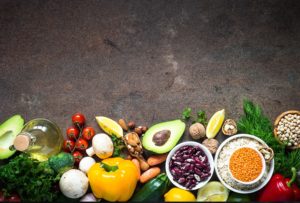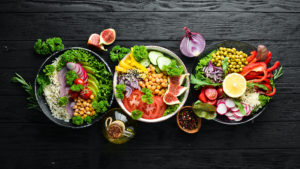Human beings are omnivorous by nature. This means that we can consume foods from both animal and plant sources. Being able to eat and process foods from a variety of sources is an advantage because it allows us to meet our daily requirements of different nutrients more easily. However, we cannot rely on only one type of food, like some animals who only feed on grasses and leaves, because we would develop deficiencies of many basic nutrients including protein, certain fats, and different vitamins and minerals. Therefore, our diet must be varied and balanced.
However, advancements in our knowledge of nutrition and food science over the past decades has shown us that foods from animal sources are not absolutely essential for human beings and in many cases can be replaced by plants. For example, we can substitute beef or chicken in our diet with beans, grains, and nuts, and still get an adequate amount of protein. This doesn’t mean that substituting animal products with plant products is something you should or must do; these decisions are very personal and having a plant-based diet is not the only way to be healthy. Nevertheless, thanks to this expansion in our knowledge of nutrition, as well as other factors, food movements such as vegetarianism and veganism have been born.
Let’s dig in:
What is a vegetarian diet?
A vegetarian diet is based mainly on the consumption of foods of plant origin but allows some foods of animal origin such as eggs or dairy.
What is a vegan diet?
A vegan diet is another approach in which no food of animal origin is consumed. It excludes everything that comes from animals, including meat as well as eggs, honey, milk, and milk products such as cheese or yogurt. It also excludes any food that has been processed with or contains any component of animal origin such as lard or gelatin. Aside from the diet, people who practice veganism also generally reject the use of materials made from animals such as leather, wool, and furs, as well as cosmetics and drugs tested on animals. The vegan diet is based entirely on foods of plant origin and is supplemented with vitamin B12, an important nutrient that is only found in animal products.

Are vegetarian and vegan diets healthy options? Are they compatible with diabetes?
In short, the answer is yes. They are completely acceptable and compatible options. In fact, reducing the consumption of animal products reduces the intake of saturated fats, which contribute to inflammatory processes in the body and increased cholesterol levels. However, if a vegetarian or vegan diet is not planned properly, it could lead to weight gain because of the increased intake of carbohydrates, or result in deficiencies of some nutrients.
Before adopting a plant-based diet, inform yourself on what a healthy plant-based diet should be like. Make sure you see a dietitian or nutritionist and get a diet tailored to your personal needs and based on the types of plant-based foods you want to incorporate in your diet. You don’t want to just increase carbohydrate intake for the mere sake of eliminating foods of animal origin from your diet. You must learn about the plant sources of protein and other nutrients and find out if any supplements are necessary. For example, vitamin B12 supplements are necessary in all vegan diets and in vegetarian diets with low consumption of eggs or dairy.
Educating yourself on the topic may seem tedious, but it’s the only way to make sure you have a plant-based diet that’s balanced, healthy and meets all your nutritional requirements.

Vegetarian or vegan diets are suitable for people with diabetes as long as the carbohydrate servings, protein and total calories are individually adapted. To help you acquire the knowledge you need, there are very useful books, science-based blogs, and dietitian-nutritionists specialized in plant-based diets that you can consult with.
It’s evident that vegetarian and vegan diets are not a fad and are here to stay. But before adopting one, it’s very important that you seek professional advice and personalize your diet based on your needs.

